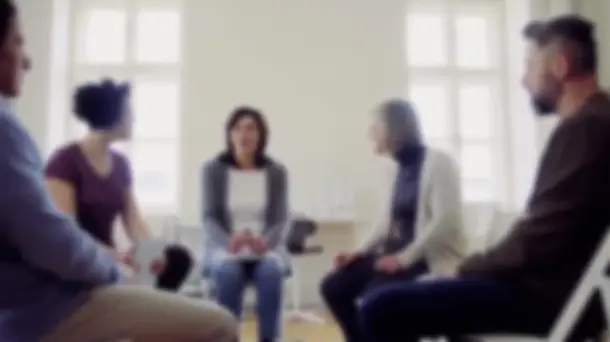Welcome to Narcotics Anonymous
What is our message? The message is that an addict, any addict, can stop using drugs, lose the desire to use, and find a new way to live. Our message is hope and the promise of freedom.

“When new members come to meetings, our sole interest is in their desire for freedom from active addiction and how we can be of help.”
It Works: How and Why, “Third Tradition”
Is NA for me?
This is a question every potential member must answer for themselves. Here are some recommended resources that may be helpful:
Need help for family or a friend?
NA meetings are run by and for addicts. If you're looking for help for a loved one, you can contact Narcotics Anonymous near you.
Subscribe to NAWS Emails
Sign up to receive Just for Today and SPAD daily meditation emails, as well as NAWS News, NAWS Updates, and more.
Never before have so many clean addicts, of their own choice and in free society, been able to meet where they please, to maintain their recovery in complete creative freedom.
Basic Text, “We Do Recover”
Recovery Quicklinks:
Service Quicklinks:
Narcotics Anonymous sprang from the Alcoholics Anonymous Program of the late 1940s, with meetings first emerging in the Los Angeles area of California, USA, in the early Fifties. The NA program started as a small US movement that has grown into one of the world's oldest and largest organizations of its type.
Today, Narcotics Anonymous is well established throughout much of the Americas, Western Europe, Australia, and New Zealand. Newly formed groups and NA communities are now scattered throughout the Indian subcontinent, Africa, East Asia, the Middle East, and Eastern Europe. Narcotics Anonymous books and information pamphlets are currently available in 49 languages.
Information About NA
Daily Meditations
Just for Today
March 03, 2026 |
Relapse |
| Page 65 |
| “There will be times, however, when we really feel like using. We want to run, and we feel lousy. We need to be reminded of where we came from and that it will be worse this time. This is when we need the program the most.“ |
| Basic Text, p. 81 |
| If we're contemplating a relapse, we should think our using through to the bitter ends. For many of us, those ends would include severe medical problems, imprisonment, or even death. How many of us have known people who relapsed after many years clean, only to die from their disease? But there is a death that accompanies a return to active addiction that may be worse than physical death. That is the spiritual death we experience when we are separated from our Higher Power. If we use, the spiritual relationship we have nurtured over the years will weaken and perhaps disappear. We will feel truly alone. There is no doubt that we have periods of darkness in our recovery. There is only one way we can make it through those troubling times: with faith. If we believe that our Higher Power is with us, then we know that all will be well. No matter how badly we may feel in our recovery, a relapse is never the answer. Together, we find recovery. If we stay clean, the darkness will lift and we will find a deeper connection to our Higher Power. |
| Just for Today: I thank my Higher Power for the gift of NA. I know that relapse is not the way out. Whatever challenges I face, I will face them with the God of my understanding. |
A Spiritual Principle a Day
March 03, 2026 |
Interdependence and Our Primary Purpose |
| Page 65 |
| “The group depends on its members, and members depend on the group being true to its purpose.“ |
| Guiding Principles, Tradition Five, “Spiritual Principles” |
| Our interdependence and its significance become clear when we reflect on our group-level service. We come to see how our primary purpose feeds our mutual needs. “I need the group and the group needs me,” as one member put it. Taken together, our individual contributions create a fertile atmosphere in which recovery blossoms. And we bloom, too, as our support for the necessary tasks of maintaining a group elevates our personal recovery. Our own gut instinct may inspire some of us to get involved in service. For others, being cornered by a seasoned home-group member who doesn't let us run away after the “We're having a business meeting today!” announcement provides the inspiration. No matter what gets us to our first group business meeting–or any other service meeting–NA service can teach us a great deal about interdependence. As a group, we can't function without members performing necessary tasks. As individuals, contributing to those tasks improves our own functioning and emboldens us to recruit others to help carry the message. Offering our time, effort, attention, perspectives–and cornering other members–keeps us alive and focused on our primary purpose. “I had less than two months clean when I went to my first group business meeting,” an addict shared. “The group was voting on motions for the World Service Conference, and they asked my opinion, saying the newcomer perspective was important. It occurred to me that there were home groups like this all around the world, talking about the same issues and sharing their perspectives–I felt connected to NA in a big way.” Whether discussing global issues in the Fellowship or local ones, our voices as members and as groups are important. Each segment of our Fellowship does its part so that we, as members, have a place to share in carrying the message of hope and recovery. Our common welfare benefits from every contribution we make and every commitment we undertake. Embracing interdependence energizes unity and vitalizes our own well-being. |
| ——— ——— ——— ——— ——— |
| At any given moment, a newcomer or seasoned member somewhere is experiencing the same message that saved my life. In NA service, I am a part of that. |
Do you need help with a drug problem?
“If you’re new to NA or planning to go to a Narcotics Anonymous meeting for the first time, it might be nice to know a little bit about what happens in our meetings. The information here is meant to give you an understanding of what we do when we come together to share recovery…”
Subscribe to NAWS Emails
Sign up to receive NAWS Updates and NAWS News emails as well as Just for Today and SPAD daily emails.



